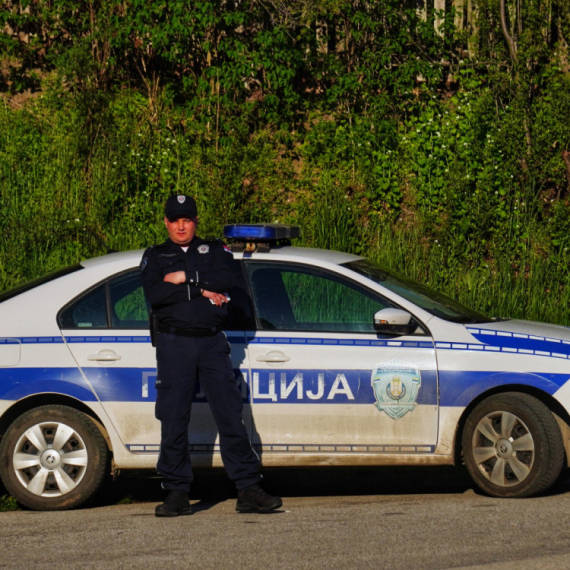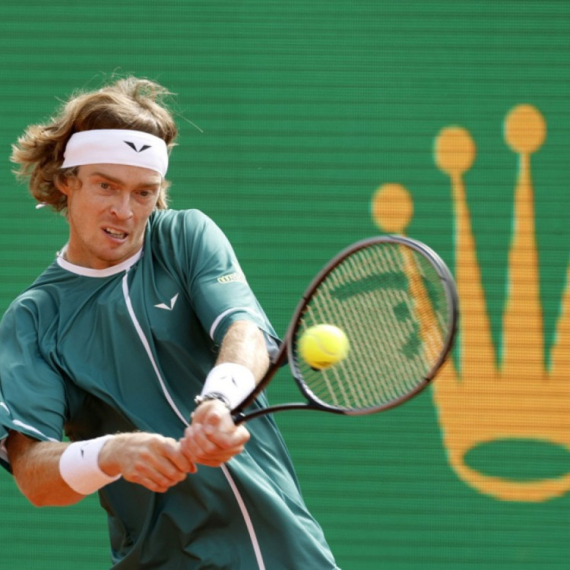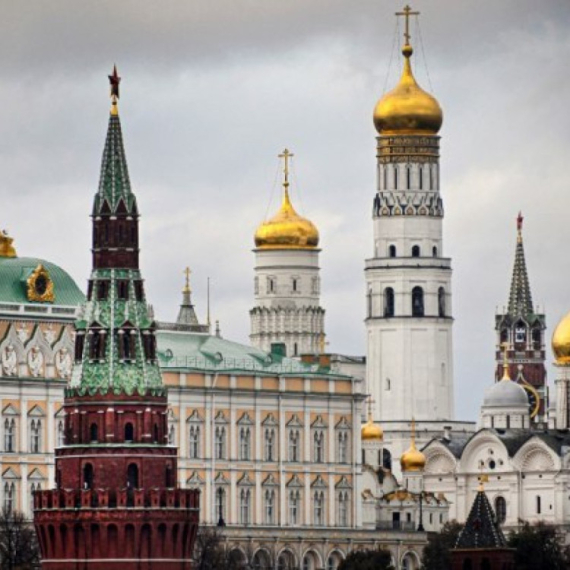Russian deputy PM: Moscow wants more Kosovo talks
Russian Deputy Premier Aleksandr Zhukov held talks Friday with top state officials in Belgrade.
Friday, 16.11.2007.
19:21

Russian Deputy Premier Aleksandr Zhukov held talks Friday with top state officials in Belgrade. Zhukov reiterated Russia's stand that a compromise solution is the only acceptable in while determining the future status of Kosovo, a solution that would satisfy both Belgrade and Pristina. Russian deputy PM: Moscow wants more Kosovo talks Speaking after a meeting with Deputy Prime Minister Bozidar Djelic, Zhukov said Russia advocates continuation of the negotiations on the future status of Kosovo. "Imposing artificial deadlines in the negotiations is therefore unacceptable for Russia," he said. Djelic thanked Zhukov for Russia's support over Kosovo. He stressed that Serbia could do "nothing, or very little", in these negotiations without that support. Djelic and Zhukov also conferred about the strengthening of the economic and cultural cooperation. Both sides underscored their interest in Russian investments in Serbia. They also announced expansion of the trade agreement between Serbia and Russia, and an extended list of Serbian products that will have preferential status in trade with that country. Also today, Zhukov met Prime Minister Vojislav Kostunica, when they confirmed the joint Serbian - Russian principled policy in the Kosovo negotiating process, based on full respect of international law, UN Security Council Resolution 1244, binding for all, the final Helsinki act and the Constitution of the Republic of Serbia, Tanjug news agency reported. After the talks, both officials concluded that announcements about a unilateral declaration of Kosovo's independence after Dec 10 are unacceptable. "Serbia and Russia will not accept such unilateral acts which threaten Serbia's sovereignty and territorial integrity as an internationally recognized state," the Serbian government's press office announced. Kostunica told his Russian guest that Serbia is "constructively participating in the negotiating process" and that in a news round in Brussels, Belgrade's delegation would present new arguments in favor of the functionality and sustainability of the proposal for essential autonomy for the ethnic Albanian minority in the province. Zhukov said that Russia's principled position is that a solution for the future status of Kosovo and Metohija should be reached in the UN Security Council on the basis of Resolution 1244, and that a solution should be the result of agreement between Serbia and the representatives of the Kosovo Albanians. He repeated that the talks should not be "bound by artificial deadlines" and that all solutions outside the UN Security Council would represent a dangerous precedent. Zhukov is also scheduled to meet with President Boris Tadic. Meanwhile in Moscow, the chair of the Russian State Duma Foreign Affairs Committee, Konstantin Kosachevhe, said that the Western approach towards the so-called frozen conflicts is based on only one criterion: "the position of those countries and nations where the conflicts exist, towards the West and NATO." "With regards the two conflict situations: Kosovo and Northern Cyprus, the West is acting one way by not insisting on the strict respect of the principle of territorial integrity, while with regards to all the other conflicts, it is acting in a totally different manner and is basing its position on that very principle," Kosachev said in an article for the Rossiyskaya Gazetta daily. According to him, Russia's European partners are striving to view as frozen conflicts only the issues of Pridnestrovie, Aphasia, Southern Ossetia and Nagorno-Karabakh, and are tacitly allowing themselves the right to resolve other cases "within the secret regime of the European Union." Kosachev rejected as unconvincing the claim about the existence of principled differences between the "post-Soviet" and all other conflicts, and said that arguments are reduced to "mantras" about the "uniqueness" of the Kosovo crisis. "The sole criteria for the different approach of the Western countries to the issue of frozen conflicts, no matter how paradoxical it seems, is only NATO and the position that the countries and nations linked to the conflicts have to it," said Kosachev, who is also a senior official of the ruling Unified Russia party. Zhukov, Djelic meet in Belgrade
Russian deputy PM: Moscow wants more Kosovo talks
Speaking after a meeting with Deputy Prime Minister Božidar Đelić, Zhukov said Russia advocates continuation of the negotiations on the future status of Kosovo."Imposing artificial deadlines in the negotiations is therefore unacceptable for Russia," he said.
Đelić thanked Zhukov for Russia's support over Kosovo. He stressed that Serbia could do "nothing, or very little", in these negotiations without that support.
Đelić and Zhukov also conferred about the strengthening of the economic and cultural cooperation.
Both sides underscored their interest in Russian investments in Serbia. They also announced expansion of the trade agreement between Serbia and Russia, and an extended list of Serbian products that will have preferential status in trade with that country.
Also today, Zhukov met Prime Minister Vojislav Koštunica, when they confirmed the joint Serbian - Russian principled policy in the Kosovo negotiating process, based on full respect of international law, UN Security Council Resolution 1244, binding for all, the final Helsinki act and the Constitution of the Republic of Serbia, Tanjug news agency reported.
After the talks, both officials concluded that announcements about a unilateral declaration of Kosovo's independence after Dec 10 are unacceptable.
"Serbia and Russia will not accept such unilateral acts which threaten Serbia's sovereignty and territorial integrity as an internationally recognized state," the Serbian government's press office announced.
Koštunica told his Russian guest that Serbia is "constructively participating in the negotiating process" and that in a news round in Brussels, Belgrade's delegation would present new arguments in favor of the functionality and sustainability of the proposal for essential autonomy for the ethnic Albanian minority in the province.
Zhukov said that Russia's principled position is that a solution for the future status of Kosovo and Metohija should be reached in the UN Security Council on the basis of Resolution 1244, and that a solution should be the result of agreement between Serbia and the representatives of the Kosovo Albanians.
He repeated that the talks should not be "bound by artificial deadlines" and that all solutions outside the UN Security Council would represent a dangerous precedent.
Zhukov is also scheduled to meet with President Boris Tadić.
Meanwhile in Moscow, the chair of the Russian State Duma Foreign Affairs Committee, Konstantin Kosachevhe, said that the Western approach towards the so-called frozen conflicts is based on only one criterion: "the position of those countries and nations where the conflicts exist, towards the West and NATO."
"With regards the two conflict situations: Kosovo and Northern Cyprus, the West is acting one way by not insisting on the strict respect of the principle of territorial integrity, while with regards to all the other conflicts, it is acting in a totally different manner and is basing its position on that very principle," Kosachev said in an article for the Rossiyskaya Gazetta daily.
According to him, Russia's European partners are striving to view as frozen conflicts only the issues of Pridnestrovie, Aphasia, Southern Ossetia and Nagorno-Karabakh, and are tacitly allowing themselves the right to resolve other cases "within the secret regime of the European Union."
Kosachev rejected as unconvincing the claim about the existence of principled differences between the "post-Soviet" and all other conflicts, and said that arguments are reduced to "mantras" about the "uniqueness" of the Kosovo crisis.
"The sole criteria for the different approach of the Western countries to the issue of frozen conflicts, no matter how paradoxical it seems, is only NATO and the position that the countries and nations linked to the conflicts have to it," said Kosachev, who is also a senior official of the ruling Unified Russia party.

























Komentari 16
Pogledaj komentare